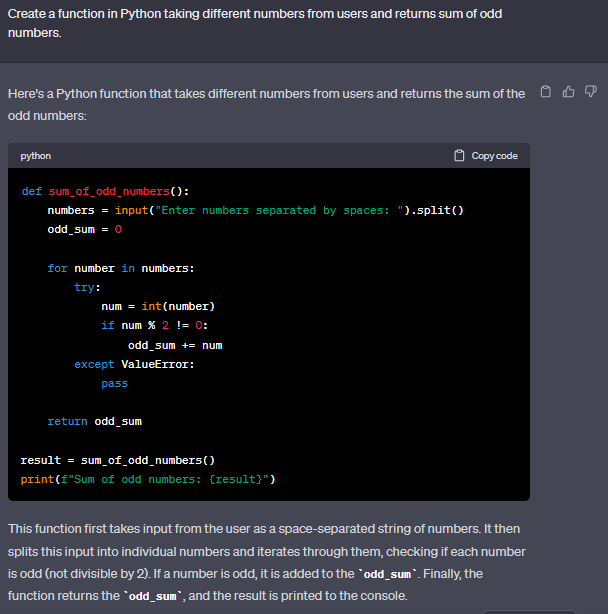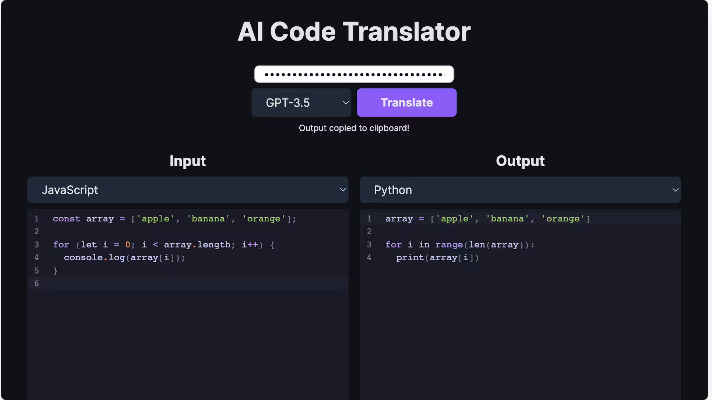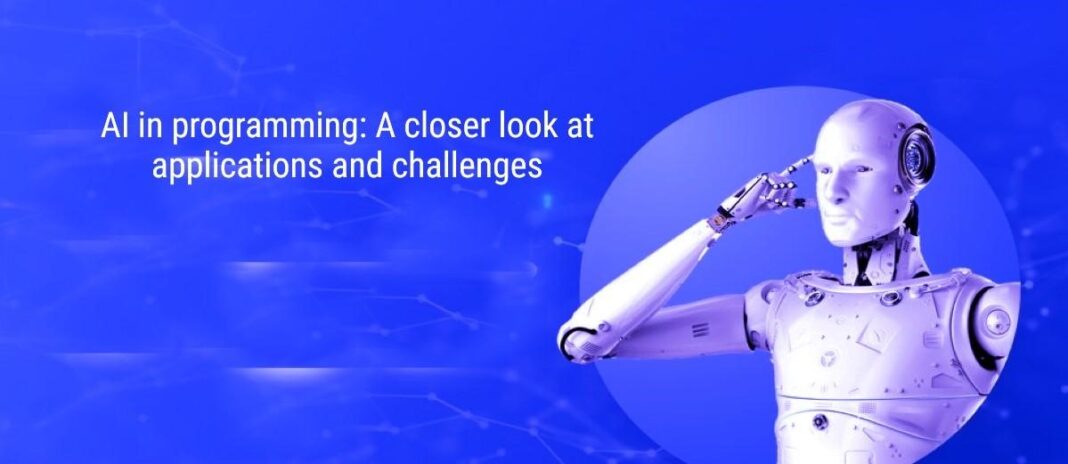Summary – The advancement of AI tools has reduced the burden on software developers. They solve programming complexities, which helps enhance productivity and speed up the development process. From code generation to testing, debugging, and refactoring, the use of AI has redefined traditional programming workflows. However, it is essential to understand that, without human supervision, AI in coding can encounter pitfalls. Join us as we delve into major use cases where AI excels in programming and development, while also exploring the scenarios where AI may face challenges.
AI is ruling over the digital world and plays a significant role in web and app development. From writing codes to generating test cases and code refactoring, it has made web and app development tasks easier.
92% of developers use AI coding at work and have provided satisfactory feedback on using it. Developers believe that it improves their productivity and gives new developmental opportunities.
Additionally, various AI systems can create functional code snippets just from bare descriptions or even from sketches. This rapid advancement in AI tools opens the door to shaping the future of developing websites and applications, taking them to new heights. However, despite this progress, AI usage still requires human supervision.
Discussed below are a few use cases where AI works wonders in programming and development in the presence of human oversight. We’ll also look at some scenarios where it fails in coding or necessitates the involvement of a web/app development expert.
Top 7 use cases of AI in programming and development
AI-powered tools simplify various tasks, from trivial to moderately intricate. They are not just helpful for novice developers but also for programming professionals. Read on to know why.
-
Code generation
AI tools automate code generation and reduce manual coding efforts, speeding up the web and app development process. Also, it helps less experienced developers leverage pre-built code templates and libraries, which facilitate faster learning and collaboration within development teams.
For instance, when providing the prompt “Create a function in Python taking different numbers from users and returning the sum of odd numbers.” to OpenAI’s ChatGPT model, the result will be –

-
Code translation
AI is incredibly useful in code translation. It can automatically convert code written in one programming language into another, saving time and effort. By understanding the logic and structure of the source code, AI can generate equivalent code in the target language, making it easier to work on different platforms or environments.
Consider a scenario where you hire web developers for your in-house team. Two of them are proficient in Python and one in JavaScript. Suppose, you have a previously written Python code snippet and you need to get it checked by the hired staff. Here the JavaScript developer can use AI code translation to translate the Python code into JS for easy interpretation.
Additionally, AI can assist in maintaining code quality during the translation process, catching potential errors, and suggesting improvements. Overall, AI-driven code translation enhances productivity and promotes efficient cross-language development.

[Img source – https://vercel.com/templates/next.js/ai-code-translator]
-
Test case generation
AI models, particularly natural language processing (NLP) models, are highly effective in test case generation. By analyzing your web and app development requirements and specifications, they can automatically generate test inputs and expected outputs. AI can also identify edge cases and potential issues that might be overlooked during manual testing. By analyzing code, test history, and user behavior, AI can prioritize and optimize test cases, saving time and resources.
Popular AI testing tools like Applitools and Testim help write efficient test cases and let developers focus on other tasks while AI handles the repetitive testing work.
-
Intelligent debugging
Debugging means locating and fixing the faulty behavior within a program. It is usually a tedious and time-consuming task, which necessitates the hiring of dedicated web/app developers.
The advancement of AI tools revolutionizes code debugging and error correction, minimizing the need to have dedicated in-house teams for the task. It not only saves time but also boosts accuracy.
Here are some of the most common ways where AI is helpful in code debugging –
- Error detection – AI can analyze code to identify errors, even if they are hard to detect. This is done by analyzing the code syntax, the flow of execution, and the data types.
- Suggesting solutions – Once an error has been identified, AI can suggest possible solutions. This can help your in-house team or the externally hired web/app developers quickly fix the error.
- Predictive debugging – AI can even anticipate potential issues before they manifest as actual errors. By analyzing historical data, code patterns, and user behavior, AI can preemptively identify areas of code that are prone to errors. This proactive approach allows developers to take preventive measures, reducing the likelihood of issues arising in the first place.
Overall, AI’s impact on code debugging is transformative, as it streamlines the error detection and correction process. By automating tasks that were once time-consuming and error-prone, AI empowers developers to deliver higher-quality software in a shorter timeframe.
-
Code review
In the process of code reviewing, AI tools (like Github’s CodeQL, Facebook’s Infer, Google’s DeepCode, and Microsoft’s IntelliCode) analyze code changes, ensuring adherence to coding standards, identifying potential bugs, and enhancing overall code quality. These tools can automatically flag issues such as syntax errors, code style violations, and security vulnerabilities, streamlining the review process and reducing the burden on human reviewers.
This allows developers to focus on higher-level aspects of software design and functionality, accelerating the development lifecycle and promoting the delivery of robust and high-quality code.
-
Code refactoring
Refactoring the code means restructuring and optimizing existing source code without altering its external behavior. It aims to enhance code readability, maintainability, and efficiency.
AI plays a crucial role in code refactoring by automating and accelerating the identification of areas that can be improved.
AI tools can analyze code patterns, identify redundancies and complex conditional statements, and suggest optimal solutions for restructuring, making the refactoring process more efficient.
This not only saves developers time but also reduces the risk of introducing new bugs during manual refactoring. Additionally, AI can provide insights into best practices and evolving coding standards, ensuring that refactored code aligns with industry trends.
-
Algorithm design and optimization
AI can generate new algorithms by analyzing existing algorithms, identifying patterns, and suggesting new approaches. This ability is particularly valuable when tackling complex problems that demand creative solutions. Developers can leverage this facility to discover more efficient algorithms for solving complex problems.
Exploring limitations: Where AI in coding fails
Though AI has made a significant reputation for simplifying web and app development tasks, it is not without limitations. Here are some areas where AI may encounter challenges or fail to discover optimal results, making it essential to hire web/app developers for your project.
-
Lack of context understanding
AI may struggle to comprehend the broader context of a project, including specific business requirements or user expectations. This can result in code suggestions that technically work but may not align with the project’s overall objectives. For instance, an AI model might generate code that prioritizes efficiency over user experience or security.
-
Difficulty in handling unstructured data
AI models excel at analyzing structured data, but they may struggle with unstructured data, such as natural language. This can limit their ability to understand and respond to complex user requirements or incorporate contextual information when generating code. For example, an AI model might generate code that doesn’t consider the nuances of human language or cultural differences, resulting in code that is not user-friendly.
-
Interpreting code comments and documentation
While AI can analyze code, it may face challenges in accurately interpreting and utilizing information from code comments and documentation. Human developers often rely on these explanations to convey crucial insights about the code’s intent, which AI may struggle to fully comprehend.
-
Handling rapidly evolving technologies
AI systems may struggle to keep pace with the rapid evolution of programming languages, frameworks, and tools. Emerging technologies might introduce new paradigms that AI models haven’t been extensively trained on, leading to suboptimal recommendations or code generation.
Conclusion
The integration of AI in programming and development unveils transformative use cases and redefines traditional workflows. It empowers developers to streamline processes, improve code quality, and focus on higher-level problem-solving.
Additionally, acknowledging its limitations is crucial, which can, however, be rectified with human supervision. Overall, the collaboration of AI and humans in programming opens doors to innovation and an effective approach to software development.
Author Bio : Amelia Swank is a senior web and app developer with over 8 years of experience. Currently with SunTec India, she specializes in the domain of digital solutions, specifically WordPress development, Web app development, Shopify development, Magento development. Her passion for technology fuels her writing, aimed at spreading insights to all. Amelia closely follows the latest IT advances to share her expertise with those interested in the field.














